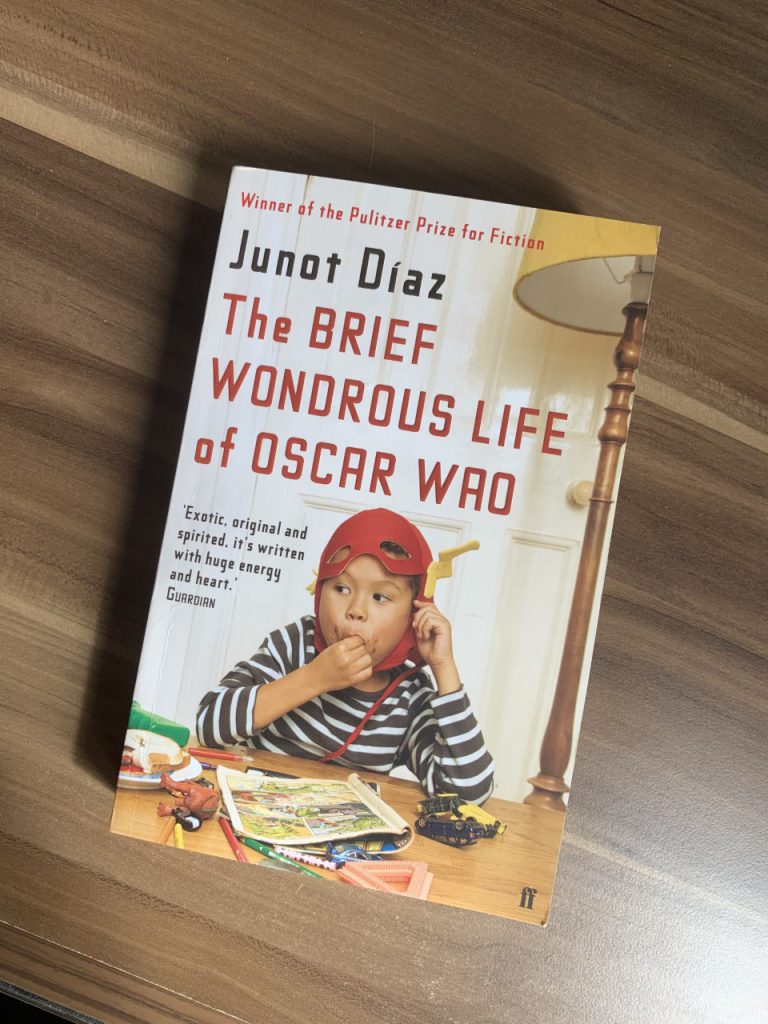Words by Tonje Beisland
The islands in the Caribbean saw their population numbers increase with rapid speed after 1945. Fuelled by issues of overpopulation and supply for labour elsewhere, migration to other corners of the world became common (Higman 2010, p. 275). In the United States, Dominicans have become the largest Latino group in New York City as they approach one million members in the city alone (Hernández et al. 2018). These migrant communities can be considered ‘transnations’, where the diasporic community’s ‘implementation or continuation of cultural forms’ takes on a special significance within the lives of the immigrants as they negotiate ‘with both the host society and their memories and attachments to home’ (Scher 2003, p. 65).
In my second year, I had the pleasure of taking Dr Rosa Andújar’s module ‘The Repeating Island: Conceptualising the Caribbean’. For one of my assessments, I read a novel which brilliantly tackles the question of transnationalism. Junot Díaz’s novel The Brief Wondrous Life of Oscar Wao perfectly exemplifies the cultural and historical negotiations of diasporic communities in its portrayal of the life of Oscar de León and his family as part of the Dominican diaspora community in New Jersey.
In the novel, the de Leóns’ Dominican diaspora community has a very specific idea of their culture; a certain conception of who they are and where they come from. The mindset of the racial superiority of Dominicans over Haitians, which has been deep-rooted in Dominican culture since the expulsion of Haitians from the Dominican Republic in 1844 (Knight 2012, pp. 159–160), is prevalent in the contemporary Dominican communities both on the island and abroad. Oscar’s mother Beli is given attention for her skin-colour: she is ‘not just any kind of black. But black black […] no amount of fancy Dominican racial legerdemain was going to obscure the fact’ (Díaz 2009, p. 248). In the Dominican culture she was born into, a ‘child’s black complexion [was] an ill omen’ (ibid., p. 248). This racial discrimination follows Beli and her children throughout their lives, such as in Oscar’s uncle’s sarcastic remark when he meets them at the airport and sees his nephew’s darker than usual complexion: ‘Great […] now you look Haitian’ (ibid., p. 32). The family of three are targets of this racial mindset regularly, but they have also internalised it themselves. When the family is in Santo Domingo Beli is scrutinised by strangers: ‘Watch out, Mom, Lola said, they probably think you’re Haitian’, but Beli retorts back with ‘La única haitiana aquí eres tú, mi amor [the only Haitian here is you, my love]’ (ibid., p. 276).[i] Despite being constantly mocked and degraded because of their complexion, the de Leóns nevertheless share the mindset themselves. This can be considered an element of continuity with the ideas of their place of origin.
The specifics of what constitutes a Dominican is further reflected in the descriptions of how the majority of his community expect Oscar to be. Oscar is nerdy, likes books, and is a fanboy. Plus, he adores American culture and his love for the Genres resists the conventional understanding of what a Latino is or should be (Gonzalez 2015, p. 53–54). But to be a ‘smart bookish boy of color in a contemporary U.S. ghetto’ is not an easy task for anyone (Díaz 2009, p. 22) and throughout his life, Oscar is constantly reminded that he does not meet the expectations of how a Dominican male is expected to behave. ‘This is a Dominican kid we’re talking about […]: [dude] was supposed to be pulling in the bitches with both hands. Everybody noticed his lack of game and because they were Dominican everybody talked about it’ (ibid., p. 24). He does not behave or possess the skills associated with other Dominican Americans his age: he cannot play sports, ‘or dominoes, was beyond uncoordinated, threw a ball like a girl’ (ibid., p. 20). Oscar is then a doubly marginalised figure: on a daily basis, he must deal with issues of race and class as well as his weight, nerdiness and inability to be what everyone around him expects and want him to be (Tayler 2008).

This marginalisation presents the inherent question of identity and belonging for members of diasporic communities. Who are they? Where do they belong? Who should they be? ‘How are they to self-identify?’ (González 2015, p. 75). Oscar seems to be a hybrid between Dominican and American and does not explicitly categorise himself as either more American or more Dominican. In contrast to the Dominican culture surrounding him which expects from the immigrant an identity which corresponds directly with the mindset ‘back home’, Oscar cannot decide precisely what it means to be a Dominican American. The novel consequently portrays the ‘inability to define one-self in America’ (ibid., p. 75) as the question of self-identification remains unsolved for Oscar and the Dominicans in their ‘host [societies]’ (Scher 2003, p. 65).
The novel’s form is essential in seeing how the transnation and globalisation impact the diasporic communities of the Dominican Republic. Díaz has included many footnotes in his novel, which often offer historical information for the reader about ‘the Dominican Republic before, during and after Trujillo’ (Carbo 2008). Díaz is adamant that the most important details which are likely to be missed by a non-Dominican audience are highlighted in these footnotes in order to frame the ‘poverty-stricken, curse-beguiled background’ from which Oscar and his family emerge (ibid.). The footnotes often serve to draw attention to the reader’s ‘inadequacy of their frames of reference’ (Jones 2018, p. 291), and their patronising and condescending tone (ibid., p. 291, 293) reinforce the reader’s understanding that they will never completely comprehend all the matters at hand. For instance, the very first footnote insists on the historical importance of the dictator Trujillo, through criticising those who missed the ‘mandatory two seconds of Dominican history’ (Díaz 2009, p. 2). Díaz chastises the readers for their ignorance of Dominican history – for not recognising the impact of global and transnational features such as ‘mass migration to and from far-flung parts of the world, intermixture of many ethnic, linguistic and cultural groups, and dynamic processes of “creolization”’ (Jones 2018, p. 291. Sheller 203, p. 174). Díaz’s footnotes underline the lack of knowledge of members of the Dominican diaspora communities and highlight how minorities are met with ignorance as well as stigma, and how they consequently face marginalisation and alienation.
The novel depicts the many nuances of how Dominican culture lives on in different shapes in the diasporic communities away from home, but also how the communities themselves can enforce normative patterns of self-identification. The novel further depicts the international audience’s lack of knowledge regarding the history of the Dominican Republic and the consequences of this parochialism in an increasingly globalised world. Through both content and form, The Brief Wondrous Life of Oscar Wao establishes old and new perspectives on the transnational relationship between the island ‘back home’ and its many children abroad, and through this negotiation also places itself within the exchange of the two sets of homes.
In a contemporary context, The Brief Wondrous life of Oscar Wao can be seen as an important supplement to the Black Lives Matter protests, as well as the recent Windrush scandal. In its portrayal of systemic racism faced by several generations of immigrants in the United States, Oscar Wao is an important read which discusses questions of race, identity, belonging and privilege in our globalised world.
Bibliography
Carbo, R. (2008). ‘The Brief Wondrous Life of Oscar Wao’. The Hispanic Outlook in Higher Education, 19(4).
Díaz, J. (2009). The Brief Wondrous Life of Oscar Wao. London: Faber and Faber.
González, C. (2015). ‘The Brief Wondrous Life of Oscar Wao: (2007)’, Reading Junot Díaz (pp. 49-88). Pittsburgh: University of Pittsburgh Press.
Hernández, R. Marrara, S. Sezgin, U. (2018). When a Neigborhood Becomes a Revolving Door for Dominicans: Rising House Costs in Washington Heights/Inwood and the Declining Presence of Dominicans [Research brief]. New York: CUNY Dominican Studies Institute Publications.
Higman, B. W. (2010). ‘The Caribbean Since 1945’, A Concise History of the Caribbean (pp. 251–326). Cambridge: Cambridge University Press.
Jones, E. (2018). ‘‘The página is still blanca’: Reading the blanks in Junot Díaz’s The Brief Wondrous Life of Oscar Wao’. Hispanic Research Journal, 19(3), 81–295.
Knight, F. W. (2012). ‘Caribbean Nation Building 1: Haiti and the Dominican Republic’, The Caribbean: The Genesis of a Fragmented Nationalism, 3rd ed. (pp. 138–164). New York: Oxford University Press.
Sheller, M. (2003). ‘Creolization in Global Culture’, Consuming the Caribbean: From Arawaks to Zombies (pp. 174–203). London: Routledge.
Scher, P. (2003). ‘The Brooklyn Carnival: Mandate for a Dual-Sited Ethnography’, Carnival and the Formation of a Caribbean Transnation (pp. 64–87). Gainesville: University Press of Florida. Tayler, C. (2008). Performance art. Accessed 29th December 2019: < https://www.theguardian.com/books/2008/feb/23/featuresreviews.guardianreview20>.
[i] All translations are my own unless stated otherwise.
 Tonje Beisland is a Norwegian third-year Liberal Arts student majoring in Comparative Literature. She is the sub-editor of the independent online publication NUET which offers a wide range of topics centred on self-expression, art and sustainability. She received Garborgprisen and the first prize in the Humanities section of ‘Young Scientists’ hosted by the Research Council of Norway for her research on feminism, intersectionality and patriarchy in secondary school. After starting her BA at King’s College London, her most recent interests have extended to the idea of globalisation within literature and the postcolonial and transnational context of the Caribbean. She is currently working on the application of Greek mythology and Norse mythology in contemporary Caribbean and Norwegian literature for her dissertation and intends to enter the publishing industry after graduating.
Tonje Beisland is a Norwegian third-year Liberal Arts student majoring in Comparative Literature. She is the sub-editor of the independent online publication NUET which offers a wide range of topics centred on self-expression, art and sustainability. She received Garborgprisen and the first prize in the Humanities section of ‘Young Scientists’ hosted by the Research Council of Norway for her research on feminism, intersectionality and patriarchy in secondary school. After starting her BA at King’s College London, her most recent interests have extended to the idea of globalisation within literature and the postcolonial and transnational context of the Caribbean. She is currently working on the application of Greek mythology and Norse mythology in contemporary Caribbean and Norwegian literature for her dissertation and intends to enter the publishing industry after graduating.
